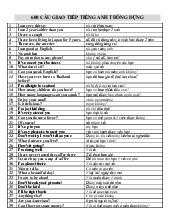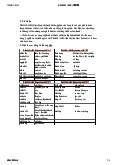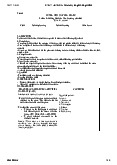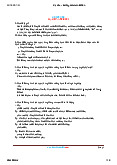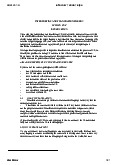












Preview text:
20:34 29/7/24
The Integrationof Culturein Foreign Language Learning Atan Advanced Level
See discussions, stats, and author profiles for this publication at: https://www.researchgate.net/publication/335544378
The Integration Of Culture In Foreign Language Learning Article · January 2016 DOI: 10.35813/1712-000-006-015 CITATION READS 1 1,069 1 author: Mourad Touati Université de M'sila
13 PUBLICATIONS1 CITATION SEE PROFILE
Some of the authors of this publication are also working on these related projects:
The problematic of distance learning in a field dependent society View project
All content following this page was uploaded by Mourad Touati on 04 October 2020.
The user has requested enhancement of the downloaded file. about:blank 1/13 20:34 29/7/24
The Integrationof Culturein Foreign Language Learning Atan Advanced Level
The Integration of Culture in Foreign Language Learning At an Advanced Level By Mourad Touati University of Msila Abstract
Contemporary language learning theories have given great attention to
the integration of cultural components in language classroom. The traditional
perspective that used to categorize culture in terms of formality and foreign
language learning in terms of priority has affected both foreign language
teaching and learning in terms of objectives, priorities and outcomes.This
article attempts to consolidate the integration of language and culture in
language classrooms from a pedagogical perspective that discusses both
linguistic, cultural objectives, expected knowledge outcomes and skills that
are projected in English language learning at an advanced level context.
Key words: Foreign language, culture, objectives, integration Résumé
traditionnelle qui catégorisait la culture en terme de formalité et
culture dans le contexte enseignement et apprentissage à travers une
perspective pédagogique ou les objectifs linguistiques et culturels, les
comme langue étrangère doivent être reconsidérés dans le contexte universitaire.
Mots Clés: Langue étrangère, culture, objectifs, intégration 106 about:blank 2/13 20:34 29/7/24
The Integrationof Culturein Foreign Language Learning Atan Advanced Level
Introductory Orientation
When we apply to learning English as a foreign language as a
course, we may be attracted by the possibility of continuing with the
language which we have studied at school .The course should teach us
acquiring rudimentary knowledge of the language. We may be
motivated to study in more depths. Our aim should be to reach a high
level of proficiency in the spoken and in the written channels, while
also being acknowledgeable about the cultural environment in which
the language is used. (Hantrais. 1989.7)
Reasons for learning English as a Foreign Language
Different people attempt to learn foreign languages for different
reasons. Gill James ( 2003) summarized reasons for learning a
foreign language in the following: learning language for the company
where someone works people may have contracts abroad where such
a language is spoken or used adding an extra qualification people
may learn a foreign language for holidays aims or to live abroad
and mostly we may want to continue with the language we studied at
school and target a higher degree of proficiency in such domain.
Language learning objectives
While teaching EFL, teachers should consider and target different
mastery of the language being learnt. The list of objectives is endless,
but it could be summarized in the following:
Assisting learners to acquire the skills that will be useful in the
subject areas of life, such as: to memorize, to put into words, to
formulate accurately and give a representation etc.
Promoting the acquisition of the learning skills that will be useful
for learning other foreign languages
Assisting learners to acquire a level of proficiency in the foreign
language that will allow them to read literary works in the foreign language. 107 about:blank 3/13 20:34 29/7/24
The Integrationof Culturein Foreign Language Learning Atan Advanced Level
Promoting the acquisition of a level of proficiency in the foreign
language that will allow the learners to use the language for particular purposes.
Learning English at an Advanced Level
Students come to university with ideas of what it will be like and
with aims of various stages of development. Through interactions with
others and experience at university and in the course they develop a
study strategy, tentative at first, which is consistent with their aims and
identity. Once again at such a level, teachers have to consider learning
effectively by insisting on the essential study skills consistent with such an advanced level.
According to Tom Burns ( 2008 ) , for instance; considering the
process of learning, realizing the active nature of learning , exploring
aspects of academic study, gaining an understanding of analytical and
critical thinking ,and gaining an understanding of learning styles and
how to make work for anyone. These are essentially what teachers should cater for.
This organization of attitudes and study patterns soon affects
educational outcomes in the form of essay marks, but also in
knowledge gained. This provides the student with objective and
subjective feedback on the effectiveness of their strategies and allows
them to introspect and perhaps redesign the study contract by changing
strategy and perhaps aims in order to be consistent once more ( Gibbs.1992.82).
Language learning objectives at an advanced level
Formerly, the aims of language degree courses were described as
learning to read a language with full appreciation of style and content
and being able to write correctly using as wide range as possible of expression and tone.
In the case of linguistics, the objective was to investigate language
for its own scientific and human interest. Students were advised to read
widely including the foreign language press, but with the warning that 108 about:blank 4/13 20:34 29/7/24
The Integrationof Culturein Foreign Language Learning Atan Advanced Level
the modernisms found in journalese should not creep into their writing.
In general objectives, however those of higher education are shifting
towards language proficiency in both oral and written forms. Emphasis
is placed increasingly on the application of language studies to real life
situations and in the analysis of the characteristics features of language with its many contexts.
Normally, the language helps the learners to prepare for a career
so emphasis should be devoted to the intellectual character training
through practical skills ;knowledge and expertise (Hantrais.1989.17)
The reference is to be made for the importance of learning how to be
analytical , to work to deadlines, to absorb information quickly, to be
acceptable, flexible, open-minded, self-disciplined, self sufficient, self-
motivated, self-confident and independently take initiative.
Any EFL course would lead to critical thinking -- an ability to
work independently, an ability to apply knowledge and skills, written
and spoken communication, self confidence, understanding other
people, cooperating with others, having a sense of responsibility and a political awareness.
Language learning experience at Algerian universities
Learning English as a foreign language in Algerian universities is
gaining more and more ground. Thousands of students are registered
yearly in the departments of English all over the country. The common
aim of learning English in all these departments is so obvious; gaining
a fluency and aptitude in communication in the foreign language.
For decades, university students did share relatively common
courses nationwide where mostly the same distribution of
programmes, content of courses, time allotted for each course, and the
pedagogies implemented remained static for generations.
Within the wave of higher education reforms an emergency for updating programmes, instructions, distribution, learning
responsibilities rather than teaching responsibilities, challenges to cope
with the shrinking labour market , and modes of evaluation and 109 about:blank 5/13 20:34 29/7/24
The Integrationof Culturein Foreign Language Learning Atan Advanced Level
assessment, imposed on all stake holders and agents in higher education
institutions to innovate and meet the requirement of the new reforms.
Moreover, learning English as a foreign language should not be
limited to a mastery of the conventional learning skills and fluency in
the target language, but providing opportunities for learners to develop
their critical attitudes; ranging from critical and analytical thinking to
reasoning and not to absorb linguistic information blindly or limiting language.
The new experience of teaching English for advanced students tends to be learner-
source of information and decision has to fade gradually and prompts
students towards autonomy though socially and culturally speaking it is
highly challenging. Autonomy is seen as one trait of free societies
where individuals are trained to be self- reliant, divergent learners,
to go through before this culture to be founded in societies like ours.
Modes of handling knowledge have always undergone other changes.
The imbalance in terms of time and content in the subjects has to
be revisited and modes of learning have to be updated. One way
lecturing is to fade gradually and other modes of learning have to be
implemented, ranging from interactive learning, cooperative learning to
tutoring have to be integrated in the classrooms. The new challenges
impose on all curriculum designers to think of promoting academic
writing abilities, methodological knowledge and epistemological
content to enable students attain better scores and achievements in the
target language by the end of the first cycle in the reformed curriculum. Language and Culture
Language and culture are closely interlinked. Language is not
only included in the definition of culture, but it also influences culture
through multiple levels of complexity. Language is a multifaceted
premise of culture formation and development, culture in turn enables
language development (Phan. 2008.26). According to experts in foreign 110 about:blank 6/13 20:34 29/7/24
The Integrationof Culturein Foreign Language Learning Atan Advanced Level
language learning and teaching, language is considered to be the only
means to decode all forms and arts associated with culture since
language is an act of thinking.
Despite dozens of definitions of language and the same number
of definitions given to culture, they all agree on the systematic quality
of both language and culture. Thanks to this quality that language and
culture have been able to maintain the stability of a particular society and community.
Most language programs include some study of foreign
societies, their institutions, structures and cultures. The place of these
background studies and their scope were shown to vary from one course to another.
As recently as the 1960's , while considering that language is
not produced in a vacuum , commentators argued that the main point of
looking at a country's history or geography , its institutions, structures
and fine arts was to gain a better understanding .
These studies programs with a historical overview of economic,
political institutions and structure culminate in the final year with
analysis of contemporary events. In some cases, the focus in a
reflective study of particular aspects of social life often approached
thematically. Most programs cover socio-cultural political and
economic systems, giving varied attention to theoretical and practical
aspects. There is normally a mix between the broad brush approach and
the opportunity for in depth- study a specific option.
Integration of Learning Foreign language and Foreign Culture
Foreign language study expands the linguistic area of experience
by affecting language comparisons. It also offers insights into another
culture and as such it is concerned with the human social area of experience.
pragmatically. It is the culture associated with a language being learnt
(Byram .1989). Therefore, language will be regarded as a mechanism
of cultural transmission promoting the values against those of the 111 about:blank 7/13 20:34 29/7/24
The Integrationof Culturein Foreign Language Learning Atan Advanced Level
regions to which it is exported; consequently countries adopting EFL
will make these countries perceptual consumers of the knowledge and
value systems in it (Philipson . 1992).
Throughout the course, the learners can be encouraged to view
the familiar from a different angle, not least in terms of people's
behaviour, and thereby widen horizons and breakdown feelings of
insularity. Teaching culture and cultural studies might follow the
following pattern: a descriptive analysis of culture associated with
language of study and as a series of statements about culture
phenomenon exemplified in the home and foreign cultures.
The ultimate guidance objective of cultural studies in foreign
language teaching makes a substantial contribution to learner's personal
development and general education. If such guidance is not present,
cultural studies will never rise above listing and learning of «typical
differences» and haphazard of daily life and simplistic geography and history. (Byram. 1989)
However, language advisors suggest that strong awareness of the
dangers of cultural contamination implicit in the learning of a dominant
international language, thus they have reacted into different ways
according to age and objectives of the learners.
- The first response to contextualize the target language in the
student's own region and culture. The implicit argument is that a culture
does not exist in the core of language, but in its movable background
and can be changed like scenery of a play. (Philipson. 1992.52)
- The second is to perceive scientific, financial or technological
knowledge as a value free because the majority of advanced language
learners are supposed to join the world of teaching.
Buttjes (1982) identifies three basic elements related to civilizations and culture studies. 112 about:blank 8/13 20:34 29/7/24
The Integrationof Culturein Foreign Language Learning Atan Advanced Level
a- Pragmatic communicative oriented -- teaching about the culture
which is intended to alleviate problems of communication in the
language, when the learner visits the foreign country.
b- To give the learners a critical understanding of the foreign people,
of their own view and their values. ( ideological understanding )
c- Critical understanding: encouraging learners to go beyond more
acceptances of particular historical development and present social
situations as inevitable and unalterable, to respond critically,
analytically and as a consequence, to analyse their own social
environment with critical understanding. (Political action oriented).
Culture Learning Objectives
- Promoting learners' familiarity with the culture and civilizations of
the country where the language which they are learning is spoken.
- Promoting acquisition of an open-minded and a positive disposition towards unfamiliar culture
- Assisting learners to develop a better understanding of their own identity and culture.
Course content and analysis
Modern content designers propose a model that caters not only for
the content to be taught but also
Any culture teaching should consider not only the spheres of activity
and consciousness of the learners to verbal and non verbal interaction,
but also the explicit information about the country or the countries
where the foreign language is spoken. The context gained much
attention from experts in culture learning and teaching, and they
propose a seven criteria model that largely deals with treatment of the context. - - 113 about:blank 9/13 20:34 29/7/24
The Integrationof Culturein Foreign Language Learning Atan Advanced Level - - -
Possible culture teaching objectives
Teaching the culture or about the foreign culture associated to the
language being learnt covers different dimensions that are integral in a
language classroom. A course would be of high expectancy if it
considers not only knowledge, but also skills and attitudes that should be enhanced. -
a-Provide information about the history, geography and political conditions of the
language culture. (Culture / culture)
b- Provide information about daily life and routines. (Culture)
c- Provide information about shared values and beliefs. (Culture/ culture)
d- Provide experiences with a rich variety of cultural expressions -
Develop attitudes of openness and tolerance towards other people and cultures. -
a - Promote reflections on cultural differences. 114 about:blank 10/13 20:34 29/7/24
The Integrationof Culturein Foreign Language Learning Atan Advanced Level
The effect culture teaching has on students and the way they are
affected by the process 'culture' cannot only be read, it has to be seen,
heard and experienced stimulation . Updating
Information about remote events tend to create a feeling of disgust
among learners, so learners should be put in touch with the novelties
and hot events for these current events tend to initiate and stimulate good discussions.
Culture learning Implications at Algerian universities
Since any language is the vehicle of transmission of the culture
associated to it and it is its mode of description and analysis, culture
cannot be excluded from any course design of any foreign language
teaching and learning. Any learner, especially at an advanced level
should have enough knowledge about the milieu where the language
he/ she is learning has evolved.
A new debate has always haunted educators about what to integrate
as foreign cultural elements in their classrooms and what objectives to
set behind such integration. In our departments, the question that has
always been raised is should we teach foreign culture associated with
the foreign language or teach foreign civilization that the foreign language describes?
Since the aims behind such courses is to learn contextualized
language, the influence of culture on the language being learnt , the
her, culture learning should be regarded very fundamental by any
learner and should be considered as a content that promotes reflective
study and analytical understanding of foreign societies.
In our departments, two modules are attributed to teaching the
culture associated to English language; American Culture/civilization
development of both societies. They are approached thematically
through broad brush approach or depth-study option. 115 about:blank 11/13 20:34 29/7/24
The Integrationof Culturein Foreign Language Learning Atan Advanced Level
The nowadays challenges are how to make good selections of both
resources, how to help students make benefits from these courses to
develop an outstanding fluency of the language used within the content,
how to develop attitudes towards these courses content and go beyond
the conventional pouring of historical events , dates and personalities
help students synthesize all they have gone through, reason and
analyze the elements that are interwoven to make those societies fairly different of theirs.
Such aims are so challenging to attain, but they deserve huge
efforts to select and update the content of themes and topics in a
socially and pedagogically motivating learning atmosphere in order to
promote reflections and critical understanding. Conclusion
Obviously, foreign language programmes the importance of the
language-culture connection , but sometimes we fall short of
recognizing the necessity to inject culture in our language classroom
forgetting that other levels of study; discourse, sociolinguistics, and
strategic competence incorporate facets of culture, and the development
of these competences is intertwined with the development of cultural
awareness. The connection between culture and language can only be
realized by those who possess knowledge of both and they will be able
to enhance learners use develop linguistic competences in the
language of study and maximize their potential in cultural knowledge , awareness and outcomes. References
Burns. T. & Sinfield. S. (2008). Essential Study Skills, the Complete Guide
to Success at University , SAGE Publications Ltd. London. UK.
Byram. M. & Grundy P. (2003). Context and Culture in Language Teaching
Vol. 15 N°3; Printed and bound in Great Britain by Short Run Press Ltd.
Gibbs. G. (1992). Improving the Quality of Student Learning, Technical &
Educational Services Ltd. Bristol, UK. 116 about:blank 12/13 20:34 29/7/24
The Integrationof Culturein Foreign Language Learning Atan Advanced Level
Hantrais. L. (1989); the Undergraduate's Guide to Studying Languages; C.M.D. Ltd. GB.
James. G. (2003). The Complete Guide to Learning a Language, How to Books Ltd. London. UK.
Le Ha. Phan. (2008). Teaching English as an International Language,
Identity, Resistance and Negotiation New perspectives on Language and
Education. Cromwell Press Ltd. London UK.
Philipson. R. (1992). Linguistic imperialism. Oxford University Press 117 about:blank 13/13
